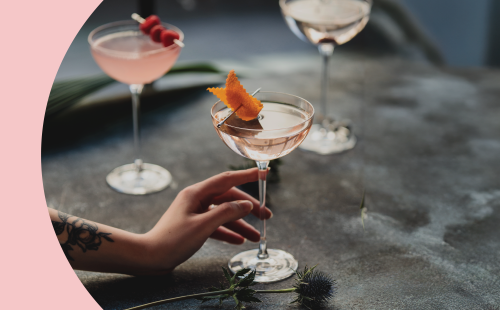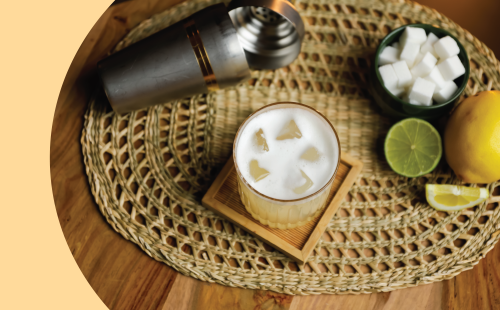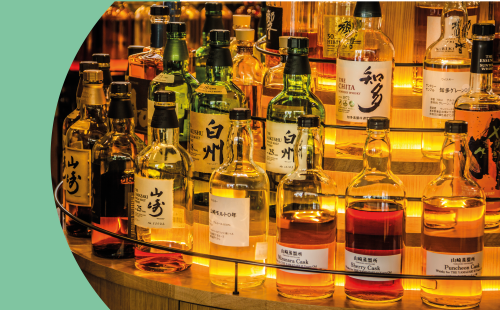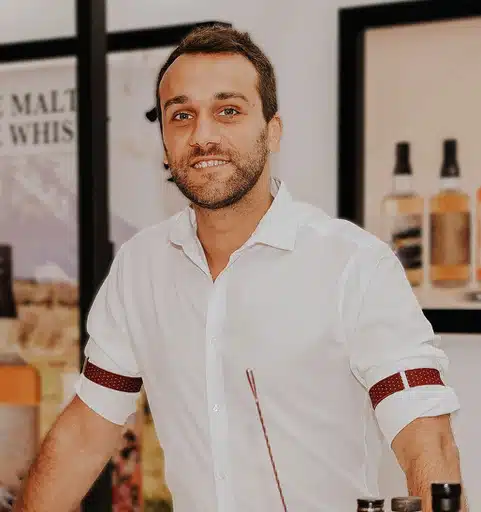I can’t count how many times I’ve mixed a cocktail only to realize it didn’t look quite right—maybe the color was off, or particles were floating around, giving it a murky appearance. Over time, I’ve learned a few effective tricks to make cocktails look as good as they taste.
Here’s my go-to guide for troubleshooting cocktail visuals, with everything I’ve found works best.
Smart Glassware Choices
One of the easiest ways I’ve found to improve the appearance of a drink is by choosing the right glassware. The glass can sometimes make or break the presentation.
- Opaque or Dark Glasses: If a drink’s color isn’t up to par, I’ll often opt for an opaque glass or one with a darker coating. It hides any visual imperfections and lets the guest focus on the drink’s flavor and aroma instead.
- Crushed Ice: Another great trick is topping with crushed ice. This method can conceal a less-than-perfect color or even add a frosty texture that elevates the whole presentation. It works well for drinks usually served over ice cubes and adds a refreshing look.

Check Your Ingredients
Sometimes, it’s just one ingredient that’s affecting the look of the cocktail. I’ve learned to inspect each component carefully to find the culprit.
- Evaluate Your Ingredients: Start by assessing each ingredient’s color and texture. For homemade components, think about whether a simple switch—like a juice instead of a purée—might improve the look. Or, try a different brand if it’s a store-bought ingredient.
- Filtration for Clarity: If a drink needs more clarity, I’ve found that filtering the ingredients through cheesecloth or a coffee filter can work wonders. It removes impurities and gives the cocktail a cleaner, more polished look—especially handy with fresh juices, thick purées and anything containing chlorophyll.
Consider Clarification Techniques
When I want a truly clear, pristine cocktail, clarification is the way to go. This step is a bit more involved, but it elevates the presentation to another level.
Types of Clarification:
- Gelatin or Agar Clarification: This method binds any unwanted particles, leaving the drink crystal clear. I’ve found it works well for most cocktails and doesn’t interfere with the taste too much.
- Milk Punch Technique: For a smooth texture and clear appearance, I sometimes use the milk punch method. It creates a unique, creamy look but can slightly change the flavor, so I make sure it complements the drink.
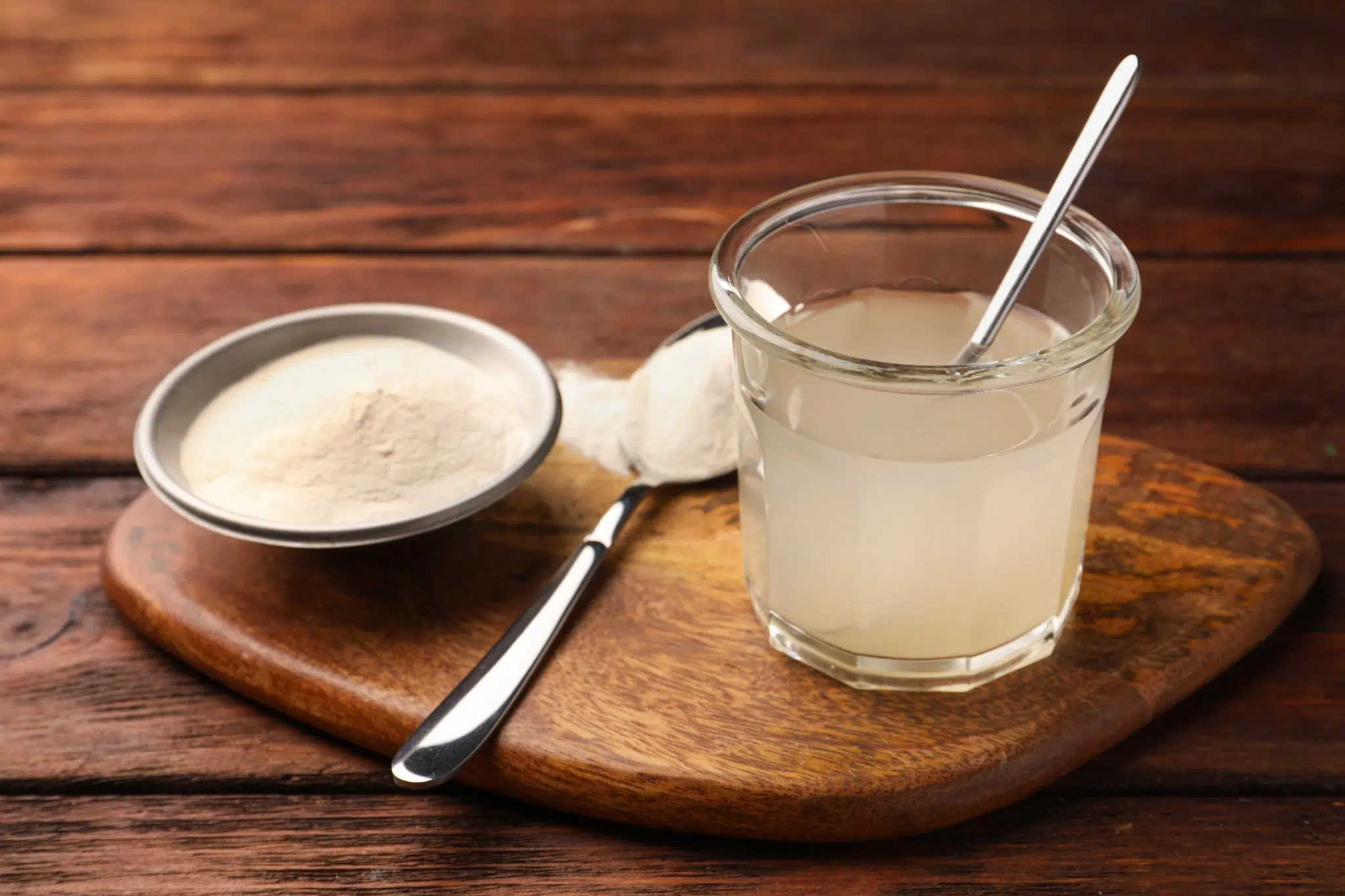
Although it can seem a bit of a fuss to make, clarification is actually a quite simple process that you’ll acquire after just a few trials. Also, it can be a great way of integrating solid ingredients into a drink (cookie dust? Strawberry jam? No problem!) without interfering with the visual aspect and, last but not least, you can actually clarify large batches of cocktails at once: it’s the perfect option if you’re hosting a party or if you simply want to have some ready-to-drink cocktails in the fridge, as most clarified cocktails will keep in the fridge for up to six months.
Adding Color and Glitter for Appeal
Finally, let’s talk about adding color to a drink: even though food coloring will rarely fix a bad color in a cocktail, it is true that it can add a nice bit of sparkle or color to any plain-looking cocktail. Of course, there is nothing bad with a plain-looking cocktail (as long as it’s good, that’s definitely the most important part!), but sometimes there are occasions when you just want your drinks to look pretty and fun! Whether you are hosting a St Patrick’s Day party, a Christmas dinner or a Barbie themed-party, there are several solutions to give your drink the bright color of your dreams:
- Color Powders: A small amount of food coloring can really bring a drink to life. I like to use shades that match the drink’s flavor—like a pop of purple or red for berry cocktails or a drop of orange for a pumpkin-flavored Halloween cocktail.
- Natural Dying Agents: If you love a bright color in your drinks but are not a fan of artificial food colorings, there are plenty of natural options you can use to naturally change the color of your drink:
- For a bright green color, infuse pandan leaves or pandan leaves powder into a syrup;
- For a purple-blue tone, use dried butterfly pea flowers. Infused into a clear spirit, these flowers will give the liquid a bright indigo color. Bonus: the color given by butterfly pea flowers tends to turn pink when in contact with acid. Try freezing a lemon or lime slice in an ice sphere (freeze the citrus slice by itself before putting it in the sphere mold with water), then watch the drink change color as the ice melts!
- For a bright yellow, saffron is a good option, but not exactly the cheapest one. Turmeric makes for a great budget-friendly option when you’re looking for warm yellow-orange tones.
- For red and fuschia tones, red beetroot and hibiscus work wonderfully as they are easy to infuse in spirits and are generally easy to find.
Just keep in mind that, contrary to industrial food coloring, these natural ingredients may impart some flavor to your drink: taste your ingredients individually before adding them to a cocktail and adapt the quantities if necessary.
- Edible Glitter: Finally, when I want a bit of shimmer, a dash of edible glitter does wonders. It creates a sparkling, liquid-gold or silver effect that’s perfect for special occasions. Just keep in mind that it doesn’t work as well on very opaque drinks, which might need other interventions.

Conclusion
When it comes to cocktails, taste is key but visual appeal is also essential and plays a large role in one’s experience of the drink. With the right glassware, a bit of color or glitter for special occasions and careful ingredient selection, you can turn a dull-looking drink into a showstopper. Clarification, while more time-consuming, is my go-to for crystal-clear presentations. These small touches make a big impact, ensuring each cocktail is a feast for the eyes and the palate.
Next step: finding the perfect garnish for your cocktail!
